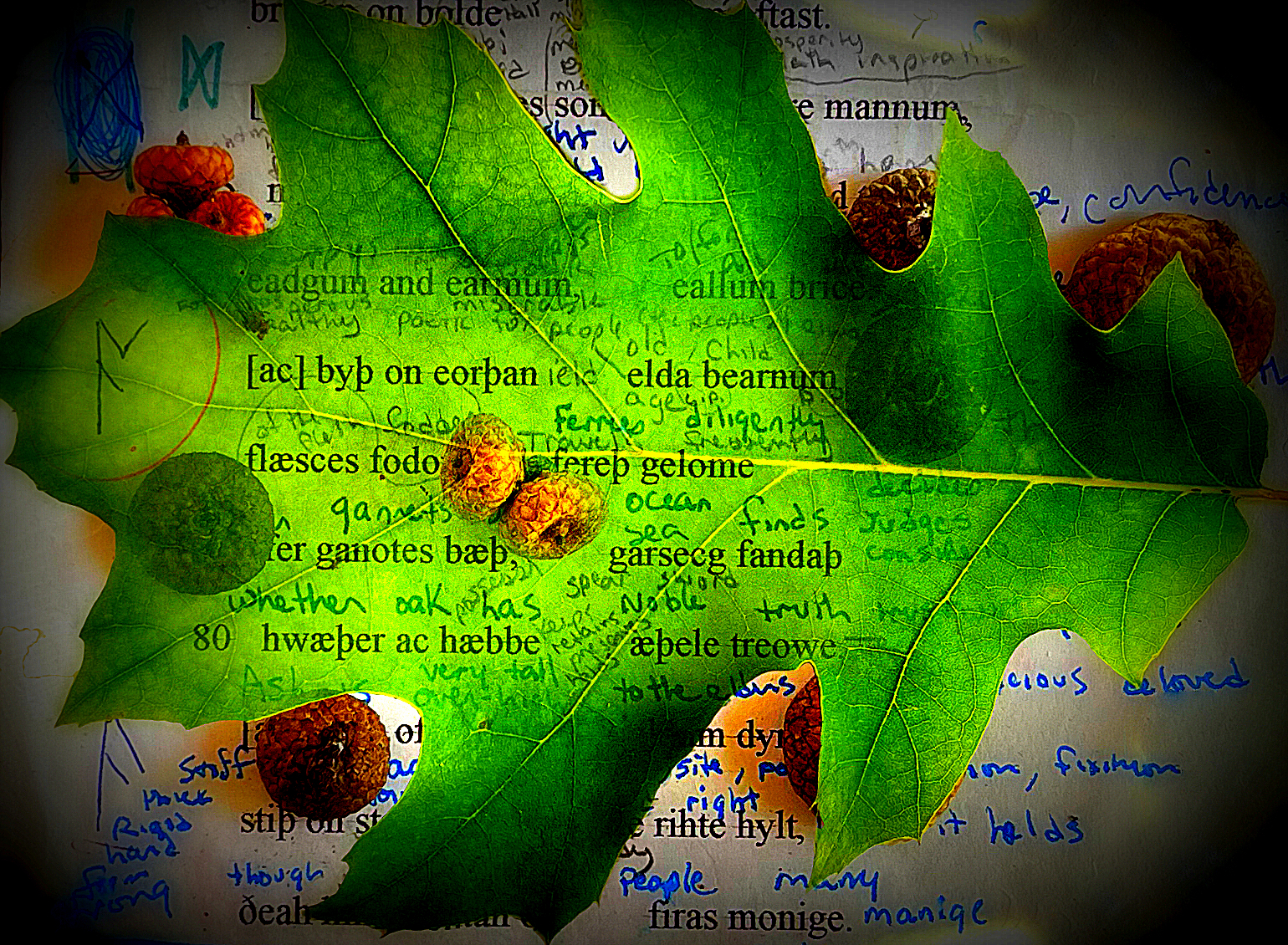 The Ac stanza is a bad riddle because the answer to the riddle is right there in the wording. Since when does an Old English riddle include its answer? I’ll tell you when. Never. That’s when.
The Ac stanza is a bad riddle because the answer to the riddle is right there in the wording. Since when does an Old English riddle include its answer? I’ll tell you when. Never. That’s when.
The Ac stanza is a good riddle because if it’s not Ac, then what is it? Hwæt? And if it does mean oak why does this riddle get to be so transparent? Let’s see if we can shine a light on it.
Clue: A line of Old English poetry starts with three alliterating stresses, three words that start with the same letter, and ends with a fourth stress that does not alliterate. The answer to the Rune Poem’s riddles is always the missing first word, so the first clue is always to be found in the beginnings of the next two stressed words: eorþan (earth) and elda (age). The answer to this riddle must be a word that starts with E. Except! When the stresses are vowels, the answer can start with a different letter having a similar sound, so it wants to be E but can still be A for ac. E and A are pretty different sounds though. A is closer to Æ and O, its children, than E. Just saying. But we don’t know for certain the accents of these speakers. And vowels are slippery and can sound all sorts of ways without losing meaning. If there is a word starting with E that might fit, it is not an obvious one: there is no Old English word meaning anything to do with the Oak tree that begins with the letter E.
Clue: Elda bearnum. Eld is age as in a span of time. It can mean the aged. It means people in a poetic sense, as in the people of old. The elda bearnum are literally the children of the aged. The aged do not usually have offspring. They’re done with babies. Yet, the answer to this riddle is something old that reproduces.
Clue: Flæsces foder. Fodder of the flesh. What flesh? Other translators sometimes include a pig here, but there is no swin, ferh, berh (words for pigs) present, not even an eofor, an E word for a wild boar. What are we are feeding with this rune? Flesh. Flesh meaning meat but also body. That’s us and the animals. We eat this thing and we eat the animals that eat this thing.
Clue: It fereþ gelome ofer ganotes bæþ. It ferries frequently over the gannet’s bath. The gannet is a sea bird, the gannet’s bath is a traditional kenning for the sea. This is a boat. We don’t eat boats: this stanza is made of two riddles having the same answer.
Clue: The garsecg is going to test this boat. Garsecg means ocean with a bit of a martial quality to it as it is a kenning made of gar: a point, a spear, and secg: a sharp edged sedge plant, a sword, a hero, or the sea. The garsecg is the ocean when it’s on the war path. It is not a calm flat sea but an angry one. These waters you’ve sailed into are spoiling for a fight and your boat had better hold up.
Clue: Æþele treowe. Æþele means noble. Treowe has a double meaning: tree and truth. With an E on the end it means trustworthy. Old English loves a pun. Boats made from this tree can be trusted to withstand a punishing sea journey.
The answer to this riddle is the oak tree. Every clue points right to it, even with the confusing misdirection of the missing rune name not being a perfect alliteration with the other stressed words in the first line when the Rune Poem is mostly so precise with its poetic conventions, and despite the baffling inclusion of the riddle answer right there in the last line. It can only be the oak. And in case we might miss it still, the last word of the stanza means tree, just to hammer it home. But we should be in no doubt. The oak can live for ages, and won’t produce acorns (ac corn, oak grain) until they are 20 years old minimum. The acorns are bitter but edible: they can be ground into flour when absolutely necessary. Animals eat them too, they would take the pigs into the forests to fatten them on acorns. And oak was the wood of choice for boat building because it is strong and trustworthy against a pissed off ocean. Why is the word for oak in the stanza, giving up the game? Is there some other oaky answer to this riddle? There isn’t. The answer is oak. So why include the word ac in the riddle? It’s a mystery. It’s a riddle. O Ac stanza, you are a bad riddle because we can see right through you.



